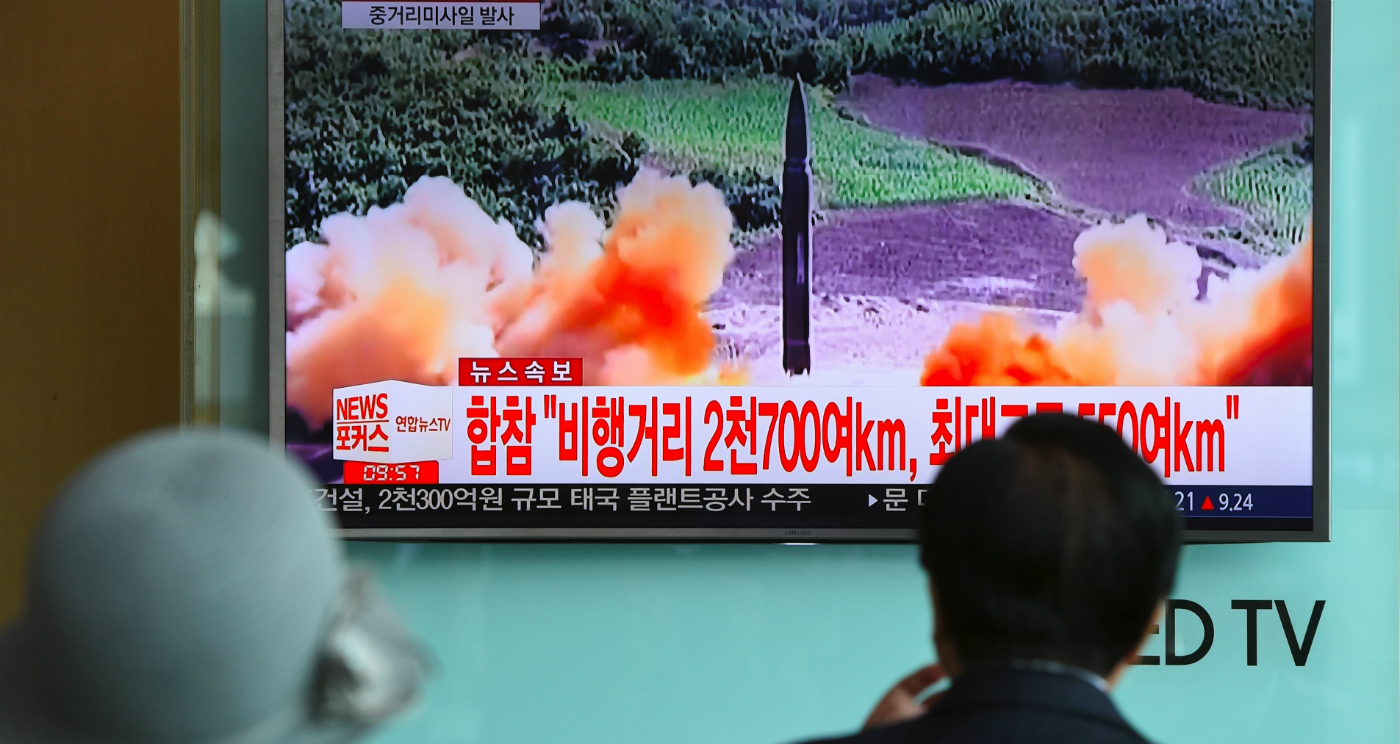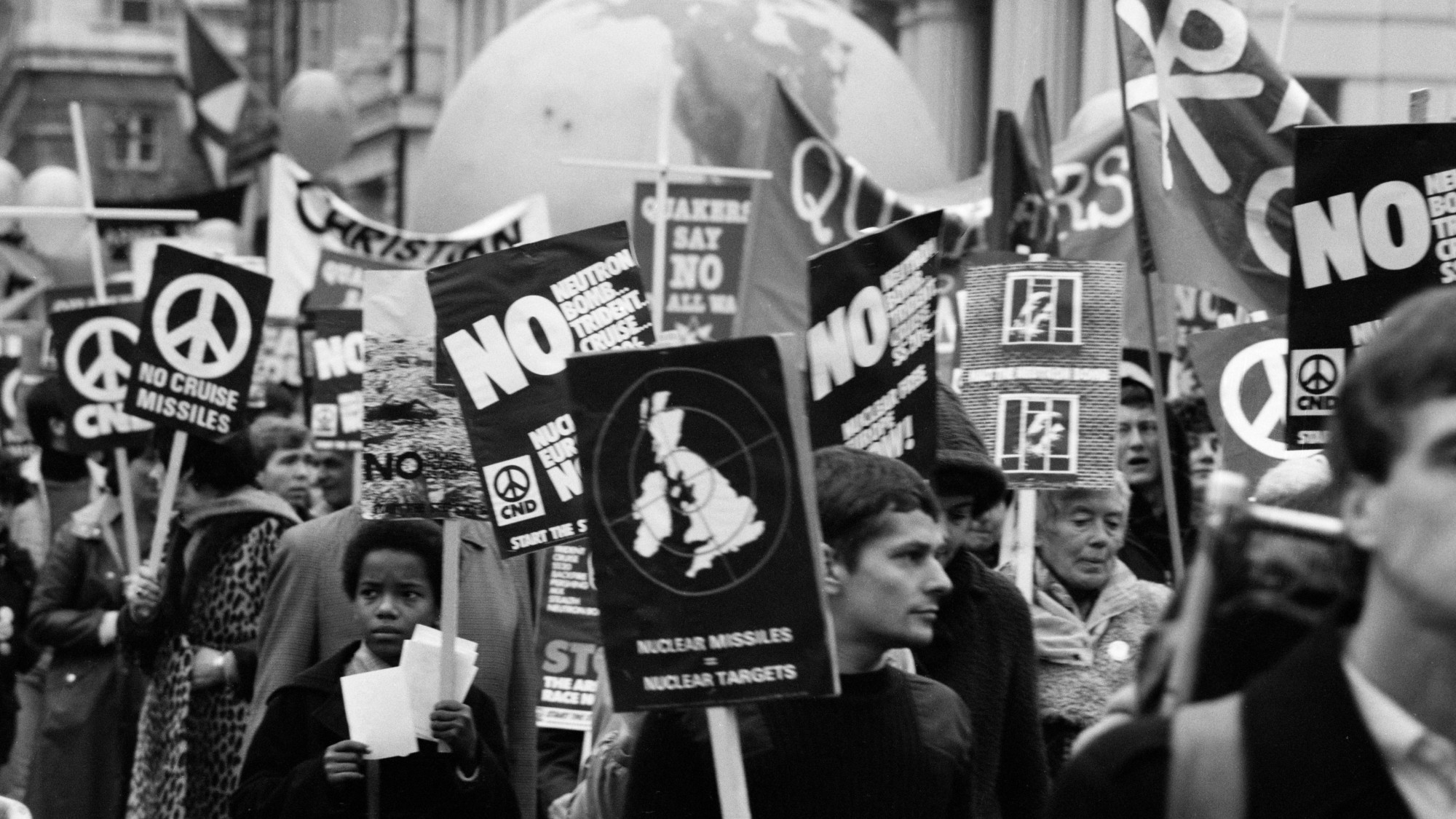Nuclear attack advice: what Brits should do
Threat of nuclear war ‘back on disaster planners’ agenda’ following Russia’s invasion of Ukraine

A free daily email with the biggest news stories of the day – and the best features from TheWeek.com
You are now subscribed
Your newsletter sign-up was successful
Britain should “dust off” its nuclear defence plans as the conflict between Russia and Ukraine escalates, an expert has warned.
The launch of a full-scale attack on Ukraine by Russia has put the threat of nuclear war “back on disaster planners’ agenda”, said The Telegraph.
Although a nuclear strike on the UK is still very unlikely, the risk is now “closer now than any time since the 1970”, a nuclear weapons expert told the paper as Whitehall’s plans for any such attack come under renewed scrutiny.
The Week
Escape your echo chamber. Get the facts behind the news, plus analysis from multiple perspectives.

Sign up for The Week's Free Newsletters
From our morning news briefing to a weekly Good News Newsletter, get the best of The Week delivered directly to your inbox.
From our morning news briefing to a weekly Good News Newsletter, get the best of The Week delivered directly to your inbox.
“In the depths of the Cold War, we were very prepared and there was a realisation an attack was a reality,” said former British Army chemical and nuclear weapons expert Hamish de Bretton-Gordon, now a fellow at Cambridge University’s Magdalene College.
Back then, “we had hundreds of bunkers around the country”, he continued. “But fast forward to 2022 and a lot of the planning and infrastructure has gone into abeyance and crumbled.”
Current state of play
Much of the UK’s nuclear defence infrastructure has been decommissioned as the threats of the Cold War faded, but a deep complex named Pindar remains under the Ministry of Defence that would “house the UK’s government and military leaders in the event of a nuclear strike”, said The Telegraph. And other nuclear response facilities are in place at other locations, including a command-and-control complex at RAF Corsham in Wiltshire.
A free daily email with the biggest news stories of the day – and the best features from TheWeek.com
“They probably need a bit of a dust off but they would be viable. I don’t have any insider information but there are probably a lot of civil servants running around at the moment making preparations,” said nuclear weapons expert de Bretton-Gordon.
Russia is believed to have the largest nuclear arsenal in the world, with 4,497 nuclear warheads, following by the US, with 3,750, according to the Arms Control Association. The UK has just 225.
The immediate aftermath
An intercontinental ballistic missile (ICBM) with nuclear warheads fired from Moscow or central Asia would probably take about 20 minutes to strike London, The Telegraph reported in 2017.
US-style sirens are unlikely to be used as a warning if an attack occurs, however. The “four-minute warning” air raid signals operated during the Cold War were almost entirely dismantled by the 1990s, so it is more likely that TV and radio would instantly switch to the news.
Text messages could also be used to send out warnings, although no system is known to have been set up for the purpose of a nuclear attack. A spokesperson for EE told the BBC in 2018 that the UK government was “working with the mobile industry to put this capability in place”.
The Times reported that the Cabinet Office had “called for telecoms experts to help to create a scheme that would send alerts to all mobile phones in a region in the event of an emergency”.
Meanwhile, the Cabinet Office’s Civil Contingencies Secretariat, responsible for emergency planning in the UK, told the BBC that emergency management arrangements were “robust... and include the capability to warn and inform the public through a range of channels including social and broadcast media platforms and direct alert such as the flood warning system”.
In 2016, the BBC revealed the contents of the so-called War Book, which was drawn up during the Cold War and contained detailed plans for broadcasting in the event of a nuclear strike, but current broadcasting arrangements are not public knowledge.
On the military front, if an attack came from North Korea, the UK’s new aircraft carrier HMS Queen Elizabeth, along with 12 F-35B fighter jets, could be brought into service to join US warships off the Korean Peninsula, says the Daily Mail. The carrier and 700-strong crew could be escorted by Type 45 destroyers and Type 23 frigates, the newspaper adds.
It is worth noting that missiles are prone to failure in multiple ways, especially those in early development, The Independent says, so a warning could be simply that. “A North Korean ICBM tipped with a nuclear warhead might miss its target by a significant distance, or explode en route,” notes the newspaper.
What’s the official advice?
The US Department of Homeland Security’s ready.gov website says that home or office basements offer more protection than those on the ground floor, and recommends shielding behind dense materials such as thick walls, concrete, bricks, books and earth. Radioactive fallout poses the greatest threat to people during the first two weeks, by the end of which it has declined to about 1% of its initial radiation level, the website says.
A large-scale chemical, biological, radiological or nuclear attack has never happened in the UK, but the threat of one “cannot be ruled out”, according to the 2020 UK National Risk Register of Civil Emergencies.
Depending on the situation, UK authorities generally suggest moving away from the immediate source of danger and following the instructions of the emergency services, who may ask residents to remove outer clothing, or undergo some form of decontamination such as showering. In some situations, residents may be advised to take shelter in the nearest building, tune in to local and national news media, and await further instructions.
Back in 1980, facing a threat from Russia, the UK issued Protect and Survive, a 30-plus pamphlet advising Britons how to make a fallout room in their home; for example, in an understairs cupboard. Families were told to stock food supplies for at least two weeks and to store three-and-half gallons (16 litres) of water in baths and basins, The Guardian reports.
“The matter-of-fact advice included everything from stocking up on loo roll and packing a tin opener to remembering to pack a warm coat and toys to entertain the kids while holed up in a bunker,” says the Daily Mirror.
-
 Health insurance: Premiums soar as ACA subsidies end
Health insurance: Premiums soar as ACA subsidies endFeature 1.4 million people have dropped coverage
-
 Anthropic: AI triggers the ‘SaaSpocalypse’
Anthropic: AI triggers the ‘SaaSpocalypse’Feature A grim reaper for software services?
-
 NIH director Bhattacharya tapped as acting CDC head
NIH director Bhattacharya tapped as acting CDC headSpeed Read Jay Bhattacharya, a critic of the CDC’s Covid-19 response, will now lead the Centers for Disease Control and Prevention
-
 New START: the final US-Russia nuclear treaty about to expire
New START: the final US-Russia nuclear treaty about to expireThe Explainer The last agreement between Washington and Moscow expires within weeks
-
 What would a UK deployment to Ukraine look like?
What would a UK deployment to Ukraine look like?Today's Big Question Security agreement commits British and French forces in event of ceasefire
-
 The history of US nuclear weapons on UK soil
The history of US nuclear weapons on UK soilThe Explainer Arrangement has led to protests and dangerous mishaps
-
 Trump peace deal: an offer Zelenskyy can’t refuse?
Trump peace deal: an offer Zelenskyy can’t refuse?Today’s Big Question ‘Unpalatable’ US plan may strengthen embattled Ukrainian president at home
-
 Vladimir Putin’s ‘nuclear tsunami’ missile
Vladimir Putin’s ‘nuclear tsunami’ missileThe Explainer Russian president has boasted that there is no way to intercept the new weapon
-
 How should Nato respond to Putin’s incursions?
How should Nato respond to Putin’s incursions?Today’s big question Russia has breached Nato airspace regularly this month, and nations are primed to respond
-
 Russia’s war games and the threat to Nato
Russia’s war games and the threat to NatoIn depth Incursion into Poland and Zapad 2025 exercises seen as a test for Europe
-
 What will bring Vladimir Putin to the negotiating table?
What will bring Vladimir Putin to the negotiating table?Today’s Big Question With diplomatic efforts stalling, the US and EU turn again to sanctions as Russian drone strikes on Poland risk dramatically escalating conflict